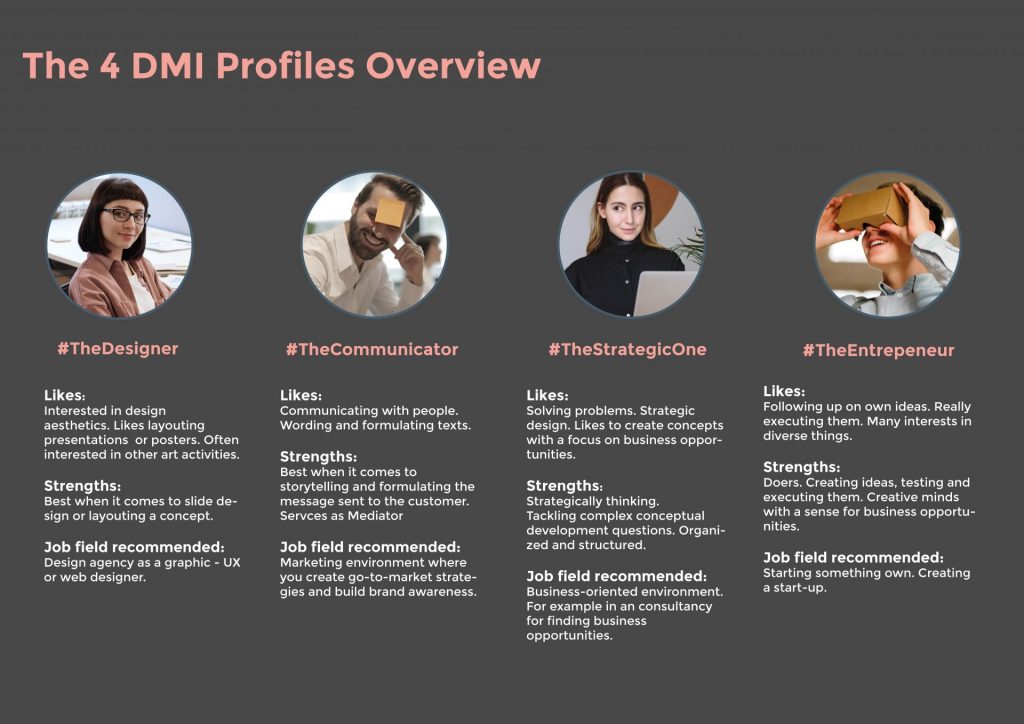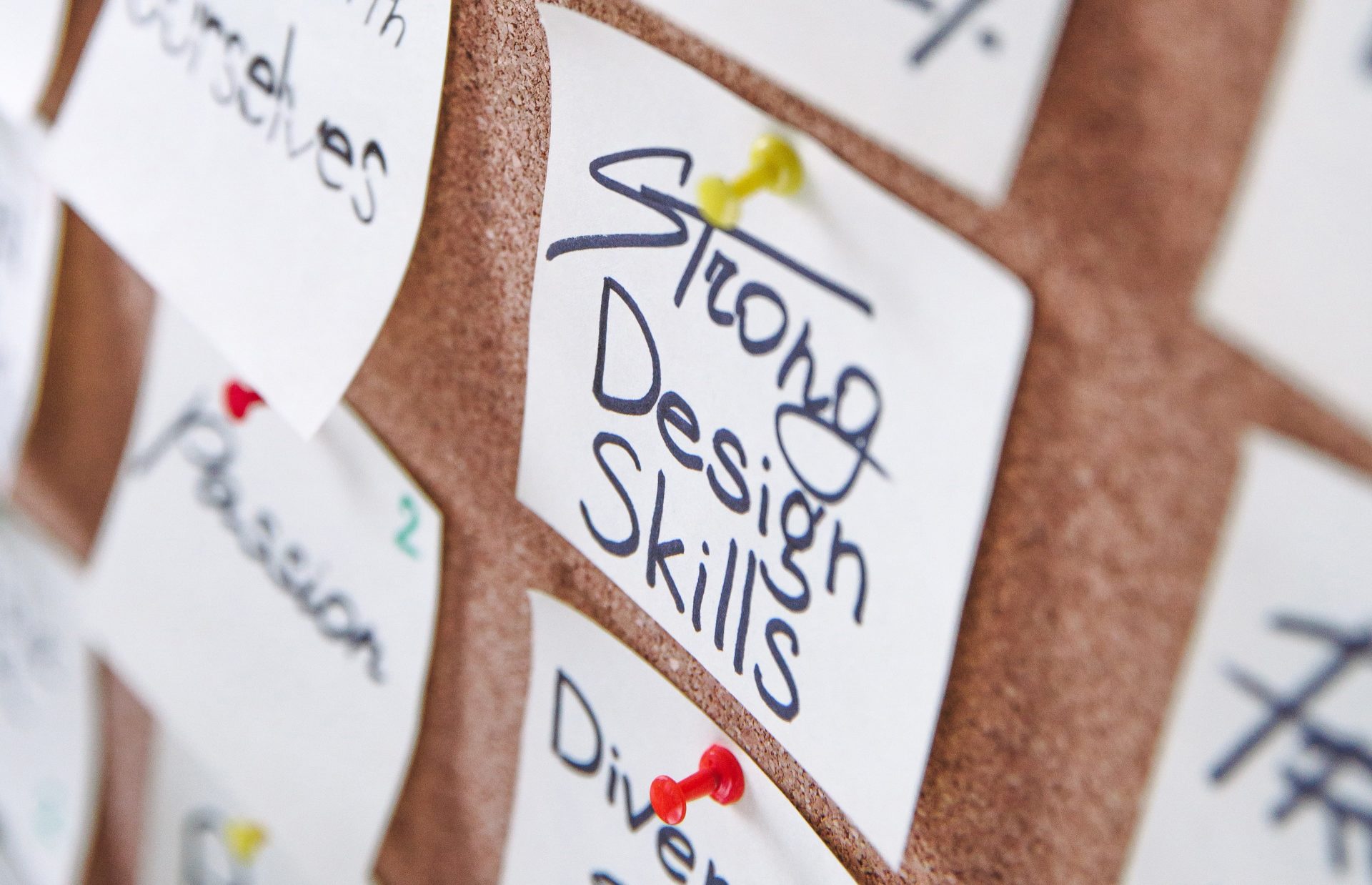Finding a job is never an easy task. For the last couple of months, I was challenged to find an internship. The most difficult task for me was to define my job profile. What are my strengths? In which field do I want to work in? To which company and what role should I apply for? During this time, I talked to many people in my Design Management International class about their experience with finding an internship. I realized that it is not a challenge only I face.
To get to the bottom of these questions, I contacted 3 former DMI students and asked them about their experiences with finding a job after graduating from DMI.
Originally, I was looking for an answer to the question of what the perfect title for Design Managers in the real world is. Lorena, one of the alumni, explained to me however that there is none. “What we learn in DMI, is definitely demanded in the market. The question is a bit what to call it.” You study Design Management, and could think your title after graduating from your studies would be the same, right? – wrong! Your working title could be Experience Consultant, User Experience Designer, Project Manager, Design Analyst, Business Designer, Innovation Manager, Communication Manager, Brand Developer, and the list goes on.
The 4 DMI Types
This statement of her, inspired me, to take the different fields of DMI apart and to combine them into 4 DMI student profiles which I elaborate about bellow. This may help you to identify which field of Design Management may best suit you. So have a close look at the different types and at the end of this article – if you cannot figure it out yourself – you can find out which DMI type you are, in a quiz.
#TheDesigner: The designer is most interested in the design aesthetics and is often also invested in other art activities -photography, for example. The designer is the best when it comes to slide design or layouting a concept. For this type, I recommend working in a design agency as a graphic – UX or web designer.
#TheCommunicator: The Communicator likes to present their idea to people. They are excited about finding the right message and wording to promote a product or service. This type is the best when it comes to storytelling and expressing themselves. They love to work with people and often serve as a mediator. For this type, I recommend a marketing environment where they can create go-to-market strategies and build brand awareness.
#TheStrategicOne: The strategic one loves solving problems and is interested in strategic design. This type likes to create concepts with a focus on business opportunities. These people are great at thinking strategically. They fancy tackling complex conceptual development questions and are organized and structured. For the strategic one, I recommend a business-oriented environment, for example in a consultancy for finding business opportunities.
#TheEntrepreneur: The Entrepreneur has often own projects they work on aside from school. They have many interests in diverse topics and love developing and, especially, executing ideas. They are doers and creative minds with a sense for business opportunities. For them, I recommend starting something own – to create a start-up, for example.

The 3 DMI Alumni and their Story
Maybe, you found a type that matches you. But what could that mean for your career path? I want to depict your possible future on the bases of the interviews I had with the 3 DMI alumni, Lorena, Milo, and Roman. Spoiler alert – their story will match perfectly into the DMI types as well.
Lorena #TheStrategicOne:

“Going in a strategic direction is certainly very future-oriented as it is a constantly growing market”
Digital Transformation and Innovation Manager at Accenture
CV: As a former seamstress, Lorena decided to study Design Management International in 2011. Midway through her studies, Lorena realized that she wanted to work in the field of strategic design at a management level in the area of innovation. Therefore, she already adapted her bachelor’s thesis to this topic. During an interview for the thesis, she established an important contact that helped her in getting her first job after graduating from DMI at Partake AG in Berlin. After three years she returned to Switzerland and started working for Accenture as Digital Transformation and Innovation Manager. By the way, she gave herself this title.
Her Tasks: Her work at Accenture involves managing cross-industrial innovation projects. It is about bringing end-to-end innovation to the client. She also consults companies on how to integrate innovation into their daily business, for example, through innovation labs.
Requirements: You must be strategically thinking and always up to tackle complex, conceptual development questions.
Her Number 1 tip for getting a job: To find a job after graduating from your studies, networking is essential. Update your LinkedIn profile and visit events, for example via Meetup!
Roman #TheEntrepreneur:

“Ideas are worth nothing, execution is worth millions”
Professional Inventor at Creaholic
CV: As a trained mechanical draughtsman, Roman started studying Design Management International in 2013. During his studies, he was interested in the field of qualitative research in the area of innovation and product development. After finishing his bachelor’s degree, Roman became a co-founder of the start-up Yelloh. Yelloh made it possible to conduct qualitative research through an online video survey tool. He worked on this project for a year until he and his colleagues decided to quit the project. He says: “Above all, I learned that the saying don’t listen to the nay-sayers is true, but you also have to be very objective in judging the market response.“ 3 months after Roman stopped working on the start-up, he met a DMI alumni and told him about Yelloh. This contact worked at Creaholic at that time and recommended Roman to his employer. Today, Roman has been working as a Professional Inventor for 2 years at Creaholic.
His Tasks: Roman mainly works on invent projects, especially in the field of product or service creation. He also coaches employees in Swisscom’s Entrepreneurship Program, where employees realize their own ideas and create their own start-up. He also develops products or service concepts with external customers. In developing these projects, he makes use of lean prototyping. Developing prototypes and testing them right away is his greatest passion at work.
Requirements: You have to be able to work well with people, be methodical in design thinking and lean methodologies, have an understanding of business issues (how to build a business case) and above all, you have to be a doer.
His Number 1 tip for getting a job: Graduates often refuse to do an internship. However, an internship, a trainee program or a start-up opens doors into the working world.
Milo #TheCommunicator:

“I am the interface between internal departments and external agencies”
Brand Manager and Content Developer at Swiss
CV: After his apprenticeship as a gardener, Milo did the creative pre-course. He then decided to study Design Management International in 2015, because he was fascinated by the connection between the two poles of design and business. After graduating from DMI, Milo applied for many positions before finding the internship at Swiss as Brand Manager and Content Developer. He sent out the application for the job via LinkedIn. Fortunately, a DMI alumni had been working at Swiss at that time. Through inside inputs, he was able to catch the job during the official interview.
His Tasks: Milo works in the Brand Management Team, which is part of the Swiss marketing team. There, he works as a Project Manager. He is the interface between internal departments and external stakeholders. He describes himself as a project manager with A clear understanding of design. Among other things, he is responsible for developing flyers, brochures, or internal communication material. As he works with all departments within the company Swiss, he has a very broad insight into the whole firm, which he particularly enjoys.
Requirements: For this job, you need to be empathic and a good mediator in order to communicate properly among the different stakeholders. An open manner helps to approach people.
His Number 1 tip for finding a job: Never get discouraged after being rejected during the application process, sometimes it takes a little while longer to find a place that suits your skillset.
Key insights
Networking: All my interview partners have gotten their current position by some kind of vitamin B, therefore building a network is the single most important learning here. In fact, former DMI students are our most valuable asset. They work in a variety of companies and fields and in my experience, they are all incredibly friendly and helpful. So, be aware of your contacts, take the chance to make new ones and maintain your LinkedIn, “because often the great jobs go away underhand and are not even advertised,” Lorena warned me.
Letter of Application: Less is more: I always thought that a comprehensive letter of application shows your motivation. Maybe you had similar assumptions and filled one page with text as well. But from Milo, who applied to several companies, I learned: “Less is more. In the beginning, my application letter was overwhelming. At some point, I got the feedback from an employer to shorten it. I’d rather have 5-10 sentences that are crisp than half a page of text.” Also don’t share all your information at once, some kind of mystery makes the employer curious to find out more.
Motivation: The tip about motivation goes hand in hand with the one above. Lorena expressed it accurately: “There is nothing more important for graduates in a letter of application then to show their motivation and a willingness to learn, when applying for a job with us at Accenture. ”
Bachelor Thesis: One advantage of knowing the field you want to work in before graduating from your studies is to be able to steer your bachelor thesis accordingly. Because even the bachelor thesis can open the door to a job or an internship just like it did for Lorena. Also, Lorena recommended doing the thesis with a company to get hands-on experience.
Master Program: At a certain point, getting a master’s degree is essential if you want to climb up the career ladder, however, the alumni did recommend to get some working experience first. Lorena expressed that accurately: “I would not recommend doing a master’s degree directly after the bachelor’s degree, because the DMI program is so generic. You don’t really know where to start. I would recommend gaining work experience, see what interests you and then decide in a second step what skills you still lack to get ahead.”
Internship or Trainee Program: Even though, many graduates want to finally start a real job, an internship or trainee program after the bachelor’s degree is almost indispensable as it seems. “You should not feel bad about doing an internship after graduation. It can open many doors for you,” says Roman strongly.
Companies to apply for
You weren’t really sure where you could apply so far – here I got the answer. These are a handful of companies in different areas that the 3 DMI alumni fancied. According to Lorena, every large company already has an innovation team by now. Therefore, this list is just a selection.
Innovation Companies:
- Accenture
- Fjord
- Frog Design
- Creaholic
- Spark works
- Melt
- INNOArchitects
Creative Consultant Agencies:
- Vetica Group
- Publicis
- A4
Creative Agencies:
- Futureworks
- Jung von Matt
- ZürichTokyo
Big companies with Innovation Teams in Switzerland:
- Swisscom
- SBB
- Die Post
- EWZ
- AXA Versicherung
Closing words
This blog was less meant to steer you in a certain direction but more to provide you with some valuable insights from alumni who were once in the same position as we are now – figuring out what we want to do with our lives after graduating from DMI. So, keep the 6 tips in mind for the coming year and especially important; start building up your network!
And finally, I leave you with the fun task of doing my personality test on the 4 DMI profiles to identify which DMI type you could be.
https://www.riddle.com/view/238433

Informasi ini menarik
Thank you for posting this, Ivana. This blog post is very valuable to DMI graduates. I was also faced with the challenge of applying for an internship, as it was difficult to find positions specifically in the field of design management as well as to describe what I do and what you want to learn. I wondered if there was such a thing as a “magic formula”. Certainly not, because it’s really not that simple, but this guide has given me valuable suggestions that I was not yet familiar with. As I planned to prepare my application documents for a job after my DMI studies during the summer break this blog post comes at exactly the right time. And I will definitely shorten my letter of application, partly to leave some mystery behind.
It’s great that you got in touch with three DMI alumni who share their work experiences, because they certainly know how we feel and what could help us.
I think you’ve got the 4 DMI types spot-on, and I could easily guess which type suits me before doing the test. It also gives the blog post a surprising touch. Your key insights along with quotes from the alumni complete the picture, and some questions I had about further education were answered here.
As you pointed out, networking is very useful when looking for a job, so I will be updating my Linkedin profile and making sure I can expand my network, since many organizations today are looking for suitable employees themselves and do not advertise open positions publicly.
Overall, I think you have structured your blog very well. Not only do readers get insights from three DMI alumni along with your key findings, but they can also assess their own DMI type and get a list of companies recommended by the alumni.
This blog post was certainly a worthwhile read, and I will keep your tips in mind when I apply for a job after the DMI studies.